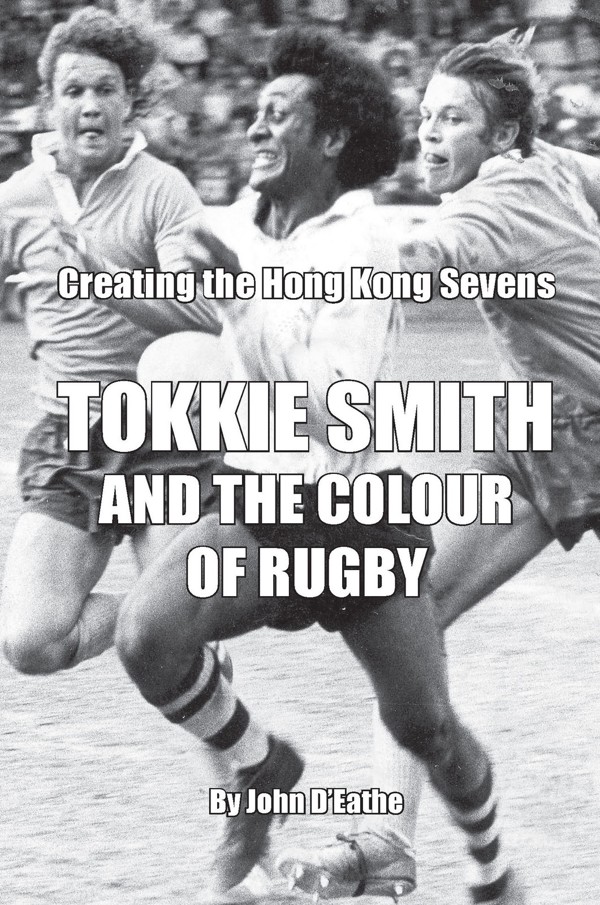
How an enlightened rogue helped create the Hong Kong Sevens and bring world rugby into the light
- A new book recounts the enormous debt Asian rugby owes to pioneer Tokkie Smith
“Rugby was traditionally the sport of the white imperialists and, at least in Hong Kong, Tokkie found things proceeding as normal,” writes John D’Eathe in his recently released book, Creating the Hong Kong Sevens – Tokkie Smith and The Colour Of Rugby. As one of the top management people at Hong Kong Land back in the ’60s, D’Eathe was a strategically embedded and integral part of the remarkable influence rugby held in the colonial corridors of power.
“The rugby elite in Hong Kong during that era were a quietly well placed group of very influential people protecting their outdated way of life as the sun set on the Empire,” D’Eathe wrote. Into this rarefied stratum wandered an irrepressible South African who had just relocated from England named Tokkie Smith. A rugby player of some renown, Smith quickly ingratiated himself with the powers that be and his associations with the sport would be the backbone of his life in Hong Kong, both socially and professionally, for the next 25 years.
“He was ahead of his time, he wanted to integrate rugby,” said D’Eathe from his home in West Vancouver. Thanks to its colonial roots, Hong Kong became a pioneer in Asian rugby culture and, in 1968, Smith and a few of the top people at the HKRFU banded together with a number of regional countries to form the Asian Rugby Football Union.
“It was the first union in the world that was multi-national,” D’Eathe recalled. “We had eight or nine different nations and they were all different colours, races and inclinations. But they played rugger together. In world rugby it was different, they were all white.” Not coincidentally, so was the Hong Kong team. It was a fact that gnawed at Smith, particularly as he led teams around the region to play indigenous sides in places like Japan, Vietnam and Thailand.

A few years later, the Rothmans tobacco firm was looking for a play in rugby when a rep approached Tokkie about doing an international event in Hong Kong. Tokkie countered by saying that it would work best as a seven-a-side competition, as opposed to traditional 15-a-side. Rothmans, however, was interested in the “big game.”
“As the discussions proceeded, Tokkie’s passion and arguments for sevens were winning the day,” D’Eathe wrote. “These were unpredictable games, great fun to watch and certainly crowd pleasers. And much easier to manage and cheaper to sponsor.”
Many claim that the Hong Kong Sevens did change world rugby totally
Rothmans would eventually agree and a few months later Cathay Pacific decided to climb aboard as co-sponsor. The original gathering in March 1976 at Hong Kong Football Club featured 12 different countries and became a breakthrough event for rugby internationally, much to the chagrin of the starched suits at the Rugby Football Union (RFU) in England. The rest is history as the event would go on to be a freewheeling rollicking festival that has become one of the premier events on the international rugby calendar.
“Many claim that the Hong Kong Sevens did change world rugby totally,” D’Eathe said. “It forced it to become much more inclusive and frankly without that event the upcoming World Cup in Japan might not happen.”

After stepping down as chairman a few years later, Smith would seriously damage his reputation by taking an ethnically mixed team of selected players on tour in apartheid South Africa to show the white establishment how diverse rugby was becoming. Even though his team was not technically in violation of the ban on national competitions with South Africa because they did not represent Hong Kong, his reputation took a hit. Now that the Sevens had big-money commercial partners, the embarrassment to the HKRFU was catastrophic. He was summarily kicked out of the HKRFU and made an outcast in Hong Kong. It was a pain he took to his grave when he died in a tragic automobile accident three years later.

For those inclined, the book is an invaluable guide to the history of rugby, and business, in Hong Kong and D’Eathe is forthright about his reasons for writing it. “I am not doing this to make money,” he said and claims in the book notes that Smith “is an unsung hero of today’s all-welcoming game but that he was deprived of his legacy and cast into obscurity by a confused, self-absorbed and elitist local rugby establishment.”
Long-time Hong Kong sage and media personality Ted Thomas also wrote about Smith in this very newspaper and his words are as true today as they were 37 years ago.
“Tokkie Smith’s crime was not that he led an amateur rugby team to South Africa,” Thomas wrote. “Tokkie’s single-minded crusade to promote international sport has, as everyone knows, threatened big business. That, in Hong Kong, is unforgivable.”

